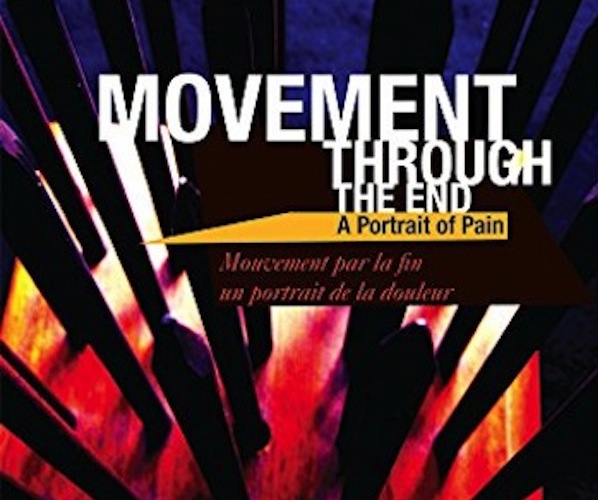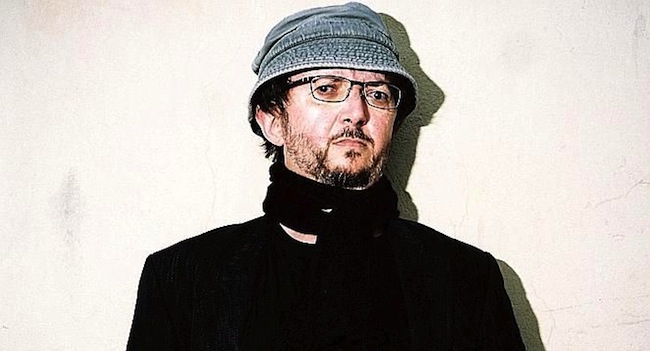Book Review: Enduring the Unendurable — Philippe Rahmy’s Extraordinary Portrait of Pain
Philippe Rahmy is afflicted with brittle-bone disease: in his superb writing, he takes off from his incurable inherited condition and ventures out courageously.
Movement through the End: A Portrait of Pain (including The Body Remains: Song of Execration) by Philippe Rahmy, translated by Rosemary Lloyd, with a preface by Jacques Dupin, Bitter Oleander Press, 102 pp., $18.

By John Taylor
I remember well that February afternoon nearly three years ago, in a Bordeaux bookstore, when I first picked up by chance—well, not exactly by chance, for I knew of Philippe Rahmy’s literary reputation—the French original of Movement through the End: A Portrait of Pain (2005). I read it completely through, standing amid the poetry books, and then I delved into Demeure le corps: Chant d’exécration (2007). Both books contained the same compelling prose — sometimes descriptive, sometimes poetic, sometimes aphoristic — filled with graphic imagery, penetrating philosophical insights, and strong yet, at the same time, thoughtfully analyzed emotions. Urgency and acuteness are combined, in this writer’s style, with an exceptional capacity for self-detachment. A self-detachment, I hasten to add, that he practices while dealing with physical suffering that threatens his life.
The titles and subtitles of these two volumes, now issued under a single cover in Rosemary Lloyd’s translation, indicate the subject matter—excruciating bodily pain—and the stylistic intensity. “I want words to return blow for blow,” declares Rahmy in The Body Remains. Referring to his “barely propped up” body on a hospital bed, the writer, who was born in 1965, is states in Movement toward the End that his “body forms an angle on which your gaze is torn to shreds.” This is exactly what happens: the reader’s gaze is ripped apart when facing such writing.
This bilingual edition also includes the afterword—here it is a preface—that the poet Jacques Dupin (1927-2012) wrote for the first French edition of Movement through the End. An important French poet, Dupin sees this short book as “burn[ing] and freez[ing].” The analogy is apt. Formulating the kind of awe and empathy that one cannot help but feel in regard to Rahmy’s writing, Dupin specifies:
I add a fragile knot to the rope that garrotes, a strip of linen to the bandages that immobilize. But I can merely try, from far off, to rejoin the separation, the solitude, the hollowing out of his malady. A malady that he keeps at a distance and under the light with such graceful and touching simplicity. At least I will have sketched its outline through a sign in the air, the eight lying down to represent infinity, lying down in order to rise again.
The malady in question is brittle-bone disease. “Pain was granted to me instead of life,” avows Rahmy, noting from the onset of Movement through the End: “My body is a splinter of glass. As I hear my bones breaking, I lose the power of sight and speech.”
These two gripping prose sequences indeed allude to multiple fractures, heart failures, respiratory failures (as well as his own refusals to breathe), long hospital stays because of all this, agonizing treatments, some respites (during which he writes), as well as close calls with both involuntary and desired death. “A handful of tablets, a bird’s carcass,” he reports in The Body Remains, “the minutes are lead shots; I can hear shells rolling on metal; a new perfusion freezes my veins; I am here, strapped in, unable to die, bound to stop me killing myself.”
Yet Rahmy is seeking not only to “portray” pain, to describe its phenomenology—which he does with memorable precision. He also ponders on the nature of suffering by reflecting on the extreme sensations that he must endure. “I chose to reside in questions,” he admits. Sometimes he meditates on the horizons that are destroyed by pain, notably that of a “beyond,” as he writes in Movement through the End: “The elsewhere of pain is still its continuation.” Yet if transcendent or hope-inspiring beyonds are barred, this implies no relinquishment of his quest to grasp Being through his life-struggle with pain. The French title Mouvement par la fin, which can be construed not only as a movement “through,” but also “by means of” or “beginning with” the End, suggests how Rahmy starts with death, which he nears often, and writes himself back toward Being.

Author Philipe Rahmy — his pain remains and, in fact, increases; but the writer has acquired awareness and a vantage point.
This return journey is often evoked as a kind of childbirth. It must be kept in mind that, while the birth pangs of a mother and her newborn child are relatively short-lived, Rahmy’s pains recur incessantly. They threaten to burst out again at any moment. Accidents do happen—this is no comforting consolation in his case. It is a disaster. In his writing, he takes off from his incurable inherited condition and ventures out courageously. In an early passage of Movement through the End, for example, he writes of “a movement” behind his left shoulder that suggests he “bring it all to an end. “It’s a voice stemming from what has been destroyed,” he explains, “identical to my own in that it masters me. It mourns before I do, and mourns more profoundly, the prey I resemble.” But such thoughts yield to other, life-fostering, perceptions. “Discovering what awaits me,” he continues, “I return to life. I regain consciousness in a series of blows. No pain can be compared to that of being born.” The pain remains and, in fact, increases; but the writer has acquired awareness and a vantage point. In a later passage, he explains:
What comes to take me finds me as I was born, knowing nothing of freedom, free to the bottom of my heart.
I love the pain I cannot escape and I put into that love all the weight the useless bring to bear.
[. . .]
For those who suffer, beauty is always spiritual. Happy are they who give their agreement to its pain, for they make their death into a prayer.
I close my eyes when pain invades me, while I dive to the depths, speaking softly—do not hold onto your soul, do not be afraid, you are being born.
These all-too-real childbirths, from within the womb of pain, lead to additional kinds of understanding. In Movement through the End, Rahmy realizes that “dying is not enough. My suffering more than my perishable nature gives me the certainty of not existing in vain.” As he grapples with pain, he learns how to “leave the world for what it is, a substance that can be shared,” and to appropriate his own body: “I discover a body which comes back to me as mine.” These are no clever paradoxes, such as an aphorist might coin, but rather the hard-earned—to say the least—conclusions of the author’s experience with pain, of the results of his experiments (one could almost say, for Rahmy has an analytical as well as a poetic mind), of his resolution to grasp the ontological implications of the agonies enveloping him.
Rahmy cannot overcome his pain, but communing with it enables him to plunge into and perhaps even resolve, at least for a while, the kinds of alienation that torment us all: the self with respect to the outside world, the mind with respect to the body, and even the self with respect to others. Impressively, a sense of fraternity arises in his writing, though in a way that few readers will have imagined. In this regard, the author glosses his own subtitle A Portrait of Pain thus:
. . .a tale of absence. The experience that cannot be communicated, at once the most intimate and the most shared, opposing the sufferer to the rest of humanity but making him the brother and the stranger. [. . .] I have no enemies because the permanent illness in which I grew up made me its equal.
Writing is intimately involved in his appropriation of existence. Yet for all its literary excellence, Rahmy’s prose adopts an anti-literary stance. This gives his style its particular force and genuineness. “I insist that I would have preferred to write nothing,” he confesses in The Body Remains, adding later on: “I don’t believe in the superiority of the word over all the other forms of life // hum rather than write; this murmuring brings relief, it rises up, then falls again like dust // it’s three o’clock, I softly breathe in splinters and air; I don’t say anything.” Toward the end of The Body Remains, he remarks: “I still have the ambition to end this work which I’m no longer even sure concerns writing.” He did end it. It concerns writing, of course, and much more—at a level rarely reached by his peers.
John Taylor has recently published A Little Tour through European Poetry (Transaction Publishers). He has written about Philippe Rahmy’s prizewinning Béton armé, a chronicle of the author’s stay in Shanghai, in the Times Literary Supplement (October 11, 2013). He is also Jacques Dupin’s translator (Of Flies and Monkeys, Bitter Oleander Press, 2011).
